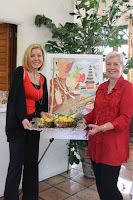This past weekend, I attended the
Initiative for MoralCourage’s first Symposium at SDSU. It opened with “The Rescuers,” a photographic exhibit with statements from people who assisted targets of the Nazis, and the genocides of Rwanda, Bosnia and Cambodia. Leora Kahn, a Fellow in the Genocide Studies Center at Yale University who organized the exhibit, discussed the criteria for being identified as a “Rescuer.” The exhibit and the program use the same standards as those used at Yad Vashem, a “living memorial to the Holocaust,” located in Jerusalem. To be considered a Rescuer, the individual cannot have gained from his actions, received any money, or have killed anyone while protecting the persecuted. There was also a discussion of
What constitutes Moral Courage? whether it involves standing up to academic fraud, military rule, or the expectations of the establishment. It is a matter of
not asking permission to do the right thing.

The following day, investigative author Edwin Black, author of the “The War Against the Weak,” (he also wrote “IBM and the Holocaust”), revealed that the eugenics movement that Hitler institutionalized in Nazi Germany was developed in the U.S. with the support of Harvard, Stanford, Yale, the American Medical Association, etc. The ‘plan’ for this program was to eliminate the bottom 10% of the population (based on a biased test of intelligence) to create a better society. In this program, poverty was considered a genetic trait that needed to be eliminated through forced sterilization and even plans for a gas chamber. Not only chilling, but frightening that this fact is so little known.
Black’s talk was followed by one about the Armenian Genocide, given by Dr. Richard Houvannisian at UCLA. He noted that the Holocaust is the only genocide that has entered into human (as opposed to ethnic) history, and history books, while that of the Armenians by the Turks is little known. It is still a crime in Turkey to talk about the Armenian genocide.
As I listened to each of these talks, which was followed by one about the African Genocides, and the talk of “Rescuers,” I realized that when my father’s family escaped from Germany in 1938, they, too, had been hidden by their neighbors for about 6 weeks, and I had never asked about who those people were. My father passed away 7 years ago, but his two younger sisters are still living, so I emailed one of them to ask if she knew the names of those neighbors. Although I have not yet heard back, I expect that she was too young to know their names. If, by chance, she or my other aunt remember any of the people who had protected them, I want to track down their descendents to thank them. I can’t believe that it never occurred to me to ask.

Are there people who protected some one in your family in a similar way? Ask, and let’s find those people who, at their own risk, did what they felt was right and just, without any expectation of return, not even acknowledgement, but shouldn’t we recognize those individuals who had the Moral Courage to do what was right?
"The Rescuers" exhibit will be open for public viewing until November 24 at SDSU's Love Library.


















After hanging up the phone, my father turned to my mother and said, “We might as well stop unpacking and move back to NY. I’ve just ended my career in Hollywood.”
But surprisingly, the phone rang a few minutes later; it was Zanuck’s secretary, this time asking, “Would it be ‘convenient’ for you to meet with Mr. Zanuck on Sunday?” My father’s point was that people respected others who had the strength of their convictions and didn’t complain about the fact that their religion ‘prevented’ them from doing something they wanted to do.
My father once got a call from an actor who was required to film a scene on the Sabbath, and didn’t know what to do. My father asked, “How much would it cost to film on Sunday, instead.” The actor replied, “$10,000.” My father said, “Then tell them you’ll pay $10,000 to film on Sunday, instead.” The director realized the actor was serious about not being able to film on Saturday, and changed the filming schedule.
Of course, my father occasionally liked to go out of his way to emphasize his ‘Jewishness.’ Also early in his career, when someone (an agent?) recommended that he change his first name because Simon sounded “too Jewish.” He agreed, and changed it to ‘Shimon.’
In spite of this, Mr. Gould is also right that there are plenty of people who would be happy to see Jews gone from Hollywood, just as many would like us to see us gone from Wall Street, medicine and law (all professions that Jews wound up in because they were prevented from being in the metalworking and woodworking guilds back in the 1600s). It's one reason some people don't believe, and resent Jews referring to themselves as "2% of the U.S. population." How can that be when we seem to be overrepresented in certain fields (but not only the top fields; apparently more than 2% of U.S. Federal prison inmates are Jewish). What must be true is a statement attributed to Jackie Mason: "Jews are like everyone else -- only more so."